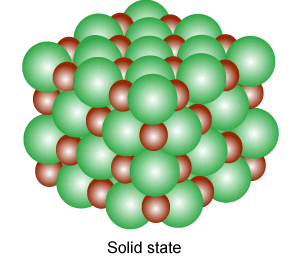Iron oxide $FeO$, crystallises in a cubic lattice with a unit cell edge length of $50 \mathring{A}$ If density of the $FeO$ in the crystal is $40\, g \,cm ^{-3}$, then the number of $FeO$ units present per unit cell is ______ (Nearest integer) Given: Molar mass of $Fe$ and $O$ is $56$ and $16 \, g \, mol ^{-1}$ respectively $N _{ A }=60 \times 10^{23} mol ^{-1}$
Correct Answer: 4
Solution and Explanation
Top Questions on types of cells
- Draw a schematic diagram of an antibody molecule and label any 4 parts. Mention their chemical nature. Name the cells which produce them.
- CBSE CLASS XII - 2024
- Biology
- types of cells
- State any 3 reasons for which these types of animals are being produced.
- CBSE CLASS XII - 2024
- Biology
- types of cells
- Name the transgenic animal having the largest number amongst all the existing transgenic animals.
- CBSE CLASS XII - 2024
- Biology
- types of cells
- Which one of the following is NOT the function of Leyding cells ?
- CUET (UG) - 2023
- Zoology
- types of cells
- For the cell reaction
\(2Fe^{3+}+2I^{-}_{(aq)}\rightarrow2Fe^{2+}+I_2{(aq)}\)
\(E^{\ominus}_{cell}=0.24\ V \ at \ 298 k.\)The standard Gibbs energy \((\Delta_rG^{\ominus})\) of the cell reaction is:
[Given that Faraday constant \( F=96500 \ C\ mol^{-1}]\)- NEET (UG) - 2019
- Chemistry
- types of cells
Questions Asked in JEE Main exam
- The moment of inertia of a square loop made of four uniform solid cylinders, each having radius R and length L (\(R \le L\)) about an axis passing through the mid points of opposite sides, is (Take the mass of the entire loop as M) :
- JEE Main - 2026
- Kinematics
Which of the following best represents the temperature versus heat supplied graph for water, in the range of \(-20^\circ\text{C}\) to \(120^\circ\text{C}\)?

- JEE Main - 2026
- Thermodynamics
- When a part of a straight capillary tube is placed vertically in a liquid, the liquid rises upto certain height \( h \). If the inner radius of the capillary tube, density of the liquid and surface tension of the liquid decrease by \(1%\) each, then the height of the liquid in the tube will change by ________ %.
- JEE Main - 2026
- thermal properties of matter
- A gas of certain mass filled in a closed cylinder at a pressure of $3.23\,\text{kPa}$ has temperature $50^\circ$C. The gas is now heated to double its temperature. The modified pressure is ___ Pa.
- JEE Main - 2026
- Thermodynamics
- Let the circle \(x^2+y^2=4\) intersect the \(x\)-axis at points \(A(a,0)\) and \(B(b,0)\). Let \(P(2\cos\alpha,2\sin\alpha)\), \(0<\alpha<\frac{\pi}{2}\), and \(Q(2\cos\beta,2\sin\beta)\) be two points on the circle such that \((\alpha-\beta)=\frac{\pi}{2}\). Then the point of intersection of lines \(AQ\) and \(BP\) lies on:
- JEE Main - 2026
- Circles
Concepts Used:
Solid State
Solids are substances that are featured by a definite shape, volume, and high density. In the solid-state, the composed particles are arranged in several manners. Solid-state, in simple terms, means "no moving parts." Thus solid-state electronic devices are the ones inclusive of solid components that don’t change their position. Solid is a state of matter where the composed particles are arranged close to each other. The composed particles can be either atoms, molecules, or ions.

Types of Solids:
Based on the nature of the order that is present in the arrangement of their constituent particles solids can be divided into two types;
- Amorphous solids behave the same as super cool liquids due to the arrangement of constituent particles in short-range order. They are isotropic and have a broad melting point (range is about greater than 5°C).
- Crystalline solids have a fixed shape and the constituent particles are arranged in a long-range order.